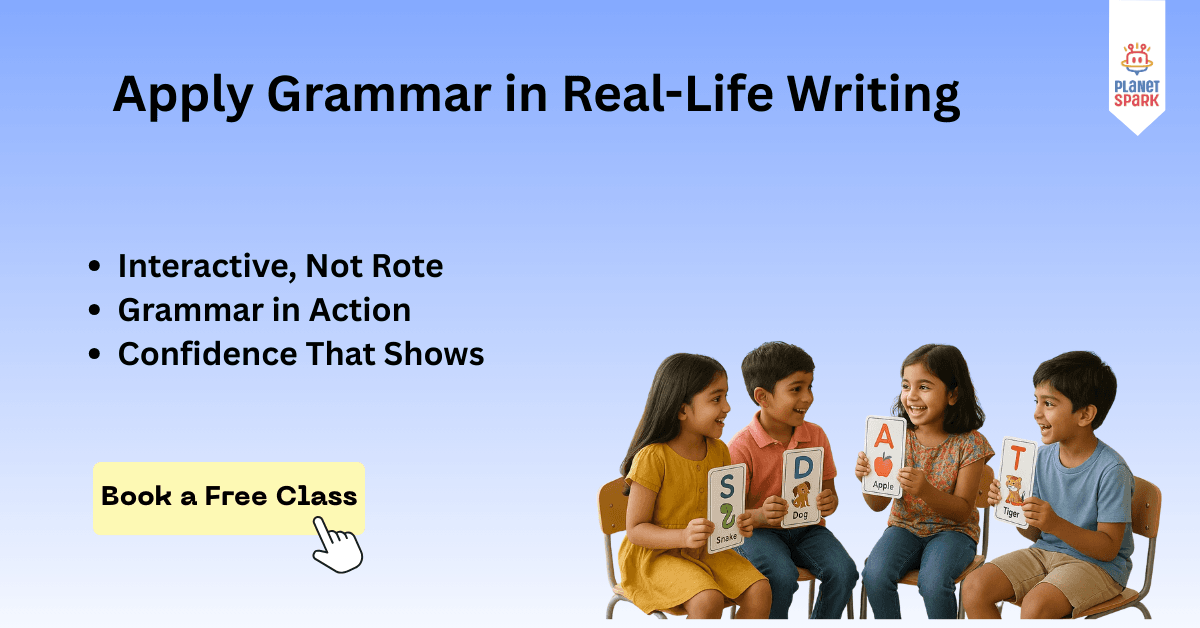Subject and Predicate: Definition, Examples and Exercises
Last Updated At: 29 Sep 2025
9 min read

Table of Contents
- What is Subject and Predicate?
- Why Subject and Predicate Matter
- Subject and Predicate Examples
- Subject and Predicate with Examples for Kids
- How to Identify Subject and Predicate
- Subject and Predicate Worksheets
- Subject and Predicate Exercises
- Common Mistakes Students Make
- Simple and Compound Subjects and Predicates
- History of Subject and Predicate in Grammar
- Subject and Predicate in Different Sentence Types
- Fun Activities to Practice Subject and Predicate
- Subject and Predicate for Kids – Tips to Teach
- PlanetSpark English Grammar Course – Make Grammar Fun for Ki
- Frequently Asked Questions (FAQs)
When we talk about English grammar, two words appear almost everywhere – subject and predicate. Every sentence we write or speak has a subject and a predicate. Understanding this concept is the foundation of strong grammar skills. Whether you are a student, parent, or teacher, this guide will help you learn what subject and predicate mean, how to identify them, and how to practice with worksheets and exercises.
In this blog, we’ll explore the subject and predicate definition, look at subject and predicate examples, solve worksheets, and try exercises that make the concept easy to grasp.
What is Subject and Predicate?
Before jumping into examples, let us first understand the basic definition.
Subject and Predicate Definition
In English grammar, a sentence is made up of two main parts:
Subject – The subject tells us who or what the sentence is about.
Predicate – The predicate tells us what the subject does or what happens to the subject.
Simply put:
Subject = Who or What the sentence is about
Predicate = What the subject is or does
Example:
Sentence: The dog barked loudly.
Subject: The dog
Predicate: barked loudly
Without a subject and predicate, a group of words cannot form a complete sentence.

Why Subject and Predicate Matter
Why should students focus on subject and predicate?
They are the building blocks of sentences.
Understanding them helps in writing grammatically correct sentences.
They improve reading comprehension.
They make it easier to learn advanced grammar topics like clauses and sentence structure.
Subject and Predicate Examples
Now that we know the definition, let’s look at more subject and predicate examples for clarity.
Simple Sentences
The cat sleeps.
Subject: The cat
Predicate: sleeps
Birds fly.
Subject: Birds
Predicate: fly
With Descriptions
My best friend lives in Delhi.
Subject: My best friend
Predicate: lives in Delhi
The little boy is playing football.
Subject: The little boy
Predicate: is playing football
Compound Subject and Predicate
Riya and Sita sing beautifully.
Subject: Riya and Sita
Predicate: sing beautifully
The teacher taught the lesson and gave homework.
Subject: The teacher
Predicate: taught the lesson and gave homework.
Give your child the confidence to write and speak fluently
Subject and Predicate with Examples for Kids
Children often learn best through examples. Here are a few subject and predicate with examples in simple sentences for young learners:
The sun shines.
Subject: The sun
Predicate: shines
The dog ran across the road.
Subject: The dog
Predicate: ran across the road
My father drives a car.
Subject: My father
Predicate: drives a car
How to Identify Subject and Predicate
Many students ask: How do I find subject and predicate in a sentence? Here’s a step-by-step method:
Find the verb (action word or state of being).
Example: She runs fast. (Verb = runs)
Ask "Who" or "What" is doing that action?
Subject = She
The rest of the sentence after the subject is the predicate.
Predicate = runs fast
By practicing this method, identifying subject and predicate becomes easier.

Subject and Predicate Worksheets
Worksheets are an excellent way to reinforce the concept. Here are a few practice sentences. Ask students to underline the subject and circle the predicate.
Worksheet 1: Identify the Subject and Predicate
The train arrived late.
Children are playing in the park.
The flowers bloom in spring.
The old man walks slowly.
My sister cooks delicious food.
Answers:
Subject – The train | Predicate – arrived late
Subject – Children | Predicate – are playing in the park
Subject – The flowers | Predicate – bloom in spring
Subject – The old man | Predicate – walks slowly
Subject – My sister | Predicate – cooks delicious food
Unlock the power of strong grammar skills.
Subject and Predicate Exercises
Try these subject and predicate exercises to test your understanding.
Exercise 1 – Fill in the blanks
Fill the missing part to complete the sentence:
The teacher _________
My friends _________
The baby _________
Birds _________
The girl _________
Possible Answers:
The teacher explained the chapter.
My friends are playing cricket.
The baby is sleeping.
Birds build nests.
The girl dances gracefully.
Exercise 2 – Identify subject and predicate
The boy is writing a letter.
The stars shine at night.
The little puppy followed me home.
Our team won the match.
The lion is called the king of the jungle.
Common Mistakes Students Make
Even though subject and predicate seem simple, students often make mistakes:
Confusing the object with the subject.
Thinking that only one word can be the subject.
Missing compound subjects or predicates.
Forgetting that every complete sentence must have both parts.
Simple and Compound Subjects and Predicates
Simple Subject
The main word that tells who or what the sentence is about.
Example: The tall boy ran fast.
Simple subject = boy
Compound Subject
More than one subject doing the action.
Example: Riya and Meera danced on stage.
Compound subject = Riya and Meera
Simple Predicate
The main verb or verb phrase.
Example: He is playing.
Simple predicate = is playing
Compound Predicate
More than one action performed by the subject.
Example: The child sang and danced.
Compound predicate = sang and danced
Strong grammar builds strong communication.
History of Subject and Predicate in Grammar
The idea of dividing sentences into subject and predicate is not new. It comes from traditional grammar, which dates back to ancient Greece. Philosophers like Aristotle described sentences as having two parts – the "thing we talk about" and "what we say about it." Over time, this concept evolved into the modern terms we use today: subject and predicate.
Knowing this background helps students understand that grammar is a system that has developed over centuries, and subject-predicate division is universal across many languages, not just English.
Subject and Predicate in Different Sentence Types
Sentences come in various forms, declarative, interrogative, imperative, and exclamatory. Each of these still contains a subject and predicate, though sometimes the subject is implied.
Declarative sentence:
The boy runs fast.Subject: The boy
Predicate: runs fast
Interrogative sentence:
Are you coming to the party?Subject: you
Predicate: are coming to the party
Imperative sentence:
Sit down quietly.Subject: (You – implied)
Predicate: sit down quietly
Exclamatory sentence:
What a beautiful day it is!Subject: it
Predicate: is a beautiful day
This shows that no matter the type of sentence, the rule of subject and predicate applies.
Don’t let grammar be a struggle – make it fun and easy with PlanetSpark.
Fun Activities to Practice Subject and Predicate
Learning grammar doesn’t have to be boring. Here are a few activities teachers and parents can try with children:
Sentence Match Game
Write subjects on one set of flashcards and predicates on another. Kids have to match them to make complete sentences.
Subject-Predicate Relay
Divide the class into two teams. One side writes subjects, the other writes predicates. Together, they form meaningful sentences.
Story Building
Give children a subject and ask them to expand it into a sentence by adding a predicate. Example: Subject = "The dog" → Sentence = "The dog chased the ball."
Error Spotting
Provide incomplete or incorrect sentences and ask kids to correct them by adding the missing subject or predicate.
These activities make learning engaging and ensure children remember the concept for a long time.
Subject and Predicate for Kids – Tips to Teach
Teachers and parents can use these strategies:
Use flashcards with subjects and predicates.
Create games where kids match subjects with correct predicates.
Give them daily practice worksheets.
Use stories and ask children to pick out the subject and predicate.

PlanetSpark English Grammar Course – Make Grammar Fun for Kids
If your child struggles with grammar concepts like subject and predicate, PlanetSpark can help.
At PlanetSpark, kids learn grammar in an interactive and enjoyable way through:
Engaging activities and worksheets.
Stories and real-life examples.
Personalized guidance from expert mentors.
Confidence-building exercises in speaking and writing.
Give your child the gift of strong grammar skills.
Frequently Asked Questions (FAQs)
1. What is subject and predicate with examples?
The subject tells who or what the sentence is about, and the predicate tells what the subject does.
Example: The cat sleeps. (Subject: The cat, Predicate: sleeps)
2. How do you identify subject and predicate in a sentence?
Find the verb first. Ask who or what is performing the action – that is the subject. The rest is the predicate.
3. Is subject always a noun?
Yes, the subject is usually a noun or pronoun, but sometimes it can also be a noun phrase.
4. Can a predicate be more than one word?
Yes. A predicate can be a single verb or a group of words describing the action.
5. Why are subject and predicate important in grammar?
They are the foundation of every sentence. Without them, a sentence is incomplete.
6. Can a sentence have more than one subject and predicate?
Yes. A sentence can have a compound subject (two or more subjects) and a compound predicate (two or more actions). Example: Ravi and Riya sing and dance.
7. What is the difference between a predicate and an object?
The predicate tells us what the subject does, while the object is the receiver of the action. Example: She reads books. (Predicate = reads books, Object = books).
8. Are subject and predicate used in questions?
Yes. In interrogative sentences, the order of words changes, but the subject and predicate still exist. Example: Did you finish homework? (Subject = you, Predicate = did finish homework).
9. Can the subject be hidden or implied?
Yes. In imperative sentences, the subject is usually implied. Example: Close the door. (Subject = you – implied, Predicate = close the door).
10. How do subject and predicate help in writing better sentences?
They help writers form clear, complete, and grammatically correct sentences. Without a subject and predicate, a sentence is incomplete and confusing.
Recommended Tests
Personalized Communication Report
Record a video to get a AI generated personalized communication report for your child
Select Learner's Class
